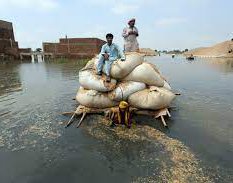The disaster, which left at least 1,700 people dead and pushed nine million into poverty, dealt a hammer blow to Pakistan’s already teetering economy. This week the country, which faces the prospect of defaulting on its debt, held talks with the International Monetary Fund to restart a stalled bailout program. Pakistan may also offer a terrifying model of climate disasters to come. “We are all — increasingly — at the mercy of forces of nature that do not respect borders,” its prime minister wrote in The Guardian.
Pakistan and the United Nations are holding a major conference in Geneva aimed at marshaling support to rebuild the country after devastating floods in what is expected to be a major test case for who pays for climate disasters.
Record monsoon rains and melting glaciers last September displaced some 8 million people and killed at least 1,700 in a catastrophe blamed on climate change.
Most of the waters have now receded but the reconstruction work, estimated at around $16.3 billion, to rebuild millions of homes and thousands of kilometers of roads and railway is just beginning and millions more people may slide into poverty.
Islamabad, whose delegation is led by Prime Minister Shehbaz Sharif, will present a recovery “framework” at the conference where United Nations Secretary General Antonio Guterres and French President Emmanuel Macron are also due to speak.
Guterres, who visited Pakistan in September, has previously described the destruction in the country as “climate carnage.”
“This is a pivotal moment for the global community to stand with Pakistan and to commit to a resilient and inclusive recovery from these devastating floods,” said Knut Ostby, United Nations’ Development Programme’s Pakistan Representative.
Additional funding is crucial to Pakistan amid growing concerns about its ability to pay for imports such as energy and food and to meet sovereign debt obligations abroad.
However, it is far from clear where the reconstruction money will come from, especially given difficulties raising funds for the emergency humanitarian phase of the response which is around half funded, according to UN data.
At the COP27 meeting in Egypt in November, Pakistan was at the forefront of efforts that led to the establishment of a “loss and damage” fund to cover climate-related destruction for countries that have contributed less to global warming than wealthy ones.
However, it is not yet known if Pakistan, with a $350 billion economy, will be eligible to tap into that future funding.
Organizers say around 250 people are expected at the event including high-level government officials, private donors and international financial institutions.
Pakistan’s ambassador to the UN in Geneva, Khalil Hashmi, said Islamabad was willing to pay for about half of the bill but hoped for support from donors for the rest. “We will be mobilizing international support through various means,” he said. “We look forward to working with our partners.”
An International Monetary Fund (IMF) delegation will meet Pakistan’s finance minister on the sidelines of the conference, a spokesperson of the lender said on Sunday, as Pakistan struggles to restart its bailout program.
The IMF is yet to approve the release of $1.1 billion originally due to be disbursed in November last year, leaving Pakistan with only enough foreign exchange reserves to cover one month’s imports.



